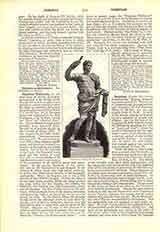

Dominus Vobiscum, an ancient form of devout salutation, incorporated in the liturgy of the Church, where it is employed as a prelude to certain formal prayers. Its origin is evidently Scriptural, being clearly borrowed from Ruth, ii, 4, and II Par., xv, 2. The same idea is also suggested in the New Testament, e.g. in Matt., xxviii, 20: “Ecce ego vobiscum sum”, etc. The ecclesiastical usage dates probably from Apostolic times. Mention of it is made (ch. iii) by the Council of Braga (563). It also appears in the sixth or seventh-century “Sacramentarium Gelasianum”. The phrase is pregnant with a deep religious significance, and therefore intensely expressive of the highest and holiest wishes. For is not the presence of the Lord—the Source of every good and the Author of every best gift—a certain pledge of Divine protection and a sure earnest of the possession of all spiritual peace and consolation? In the mouth, therefore, of the priest, who acts as the representative and delegate of the Church, in whose name and with whose authority he prays, this deprecatory formula is preeminently appropriate. Hence its frequent use in the public prayers of the Church‘s liturgy. During the Mass it occurs eight times, namely, before the priest ascends the altar, before the two Gospels, the collects, the Offertory, the Preface, the Post-Communion oratio, and the blessing. On four of these occasions the celebrant, whilst saying it, turns to the people, extending and joining his hands; on the other four he remains facing the altar. In the Divine Office this formula is said before the principal oratio of each Hour by priests, even in private recitation, because they are supposed to pray in union with, and in behalf of, the Church. Deacons say it only in the absence of a priest or with his permission if present (Van der Stappen, De officio divino, 43), but subdeacons use instead the “Domine exaudi orationem meam”. Contrary to general usage, the “Dominus Vobiscum” does not precede the prayer of the Blessed Sacrament before Benediction is given. Gardellini (Comment. in Inst. Clem., §31, n. 5) explains this anomaly on the ground that the blessing with the Sacred Host in the monstrance effectively contains all that is implied in the formula. Bishops use the “Pax Vobis” (q.v.) before the collects in Masses where the Gloria is said. The response to the “Dominus Vobiscum” is “Et cum spiritu tuo” (cf. II Tim., iv, 22; Gal., vi, 18; Phil., iv, 23). Formerly this answer was rendered back with one voice by the entire congregation. Among the Greeks there is a corresponding form “Pax omnibus” (Liturgy of St. Basil). The Council of Braga, already mentioned, ordained (Mansi, IX, 777) that priests, as well as bishops, to whom alone the Priscillianists sought to restrict it, should adopt this formula.
PATRICK MORRISROE.

